My visit to Poland by Ros Hart
Ros Hart, Southern Regional Coordinator for AJR has written this moving piece about her recent visit to Poland (an abridged version was published in the AJR Journal)
It was my privilege to recently visit Poland with JRoots. It was a trip that I knew I had to do but I went with trepidation and fear of what I would experience. We were fortunate enough to have the survivor, Mala Tribich accompany us, and we not only heard her incredible story, we walked the streets of her youth whilst she explained what happened to her and her family. Her story was haunting, from the ghetto of Piotrkow to the Ravensbruck concentration camp and Bergen Belsen where she contracted typhus. Most of her family perished, but she and her brother Ben (Helfgott) somehow survived, came to England and built good lives for themselves. Mala was so dignified in the way she spoke. She does not hate and has no anger, she spends her life educating people about the horrors of what happened, to ensure it never happens again.
Our three days in Poland were jam-packed full, starting early and finishing late. Our tour guide, Rabbi Raphy Garson was inspirational in the way he brought his stories to life with so much passion and knowledge. It was extremely cold. Our weather was a mix of torrential rain and deep snow, which added to the whole atmosphere of what we were doing and where we were.
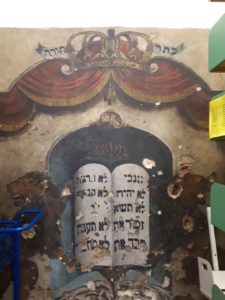 We went into a normal looking apartment block near where Mala had once lived, and climbed the rickety stairs to the attic, where we saw Hebrew writing that obviously had once been splendid and vivid but was now spattered with bullet holes. It had been a synagogue, but now an apartment building. The worn wooden floor slats were broken and probably unsafe, and the rafters of the attic were used to dry the residents’ washing and store unwanted possessions. We stood in silence whilst Rabbi Garson recited Kaddish and then this once beautiful, old synagogue was brought to life again as our little group of determined, defiant Jews from North West London, all with different levels of belief and observance, stood in the gloom in hushed awe and sang Hatikva loud and proud. It brought tears to many of us. When we exited, some of the residents had come outside to look suspiciously at us. Rabbi Garson had us join hands in the snow and we danced and sang Am Yisrael Chai and other rousing Jewish songs, which confirmed the locals’ belief that the Jews were completely mad!
We went into a normal looking apartment block near where Mala had once lived, and climbed the rickety stairs to the attic, where we saw Hebrew writing that obviously had once been splendid and vivid but was now spattered with bullet holes. It had been a synagogue, but now an apartment building. The worn wooden floor slats were broken and probably unsafe, and the rafters of the attic were used to dry the residents’ washing and store unwanted possessions. We stood in silence whilst Rabbi Garson recited Kaddish and then this once beautiful, old synagogue was brought to life again as our little group of determined, defiant Jews from North West London, all with different levels of belief and observance, stood in the gloom in hushed awe and sang Hatikva loud and proud. It brought tears to many of us. When we exited, some of the residents had come outside to look suspiciously at us. Rabbi Garson had us join hands in the snow and we danced and sang Am Yisrael Chai and other rousing Jewish songs, which confirmed the locals’ belief that the Jews were completely mad!
That night we walked in single file through the forest in the pouring rain until we reached a memorial to 500 innocent souls who were murdered simply for being Jewish. We grouped around the headstones and read poems and letters that loved ones had written to their families when they realised their lives were fated. Once again, in the midst of horror, we came together as one bonded Jewish group, and recited memorial prayers whilst holding hands and we could almost imagine the fear of being there at the time of such atrocities.
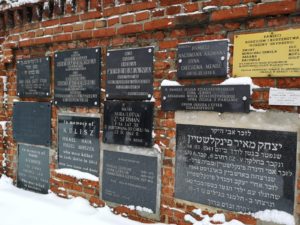 We visited the incredible Lodz cemetery and saw over 40,000 graves of those slaughtered in the ghetto. Where there were no bodies to bury, there were plaques on the walls remembering those unfortunate, desperate people who perished. The snow was deep and the temperature was below zero. We were a horrified group of Jews who thought they knew what had happened during the war. We realised we knew very little. However, in the midst of despair, there were also incredible stories of bravery and determination against all odds, which Rabbi Garson told us in his inimitable animated style which had us hanging on his every word.
We visited the incredible Lodz cemetery and saw over 40,000 graves of those slaughtered in the ghetto. Where there were no bodies to bury, there were plaques on the walls remembering those unfortunate, desperate people who perished. The snow was deep and the temperature was below zero. We were a horrified group of Jews who thought they knew what had happened during the war. We realised we knew very little. However, in the midst of despair, there were also incredible stories of bravery and determination against all odds, which Rabbi Garson told us in his inimitable animated style which had us hanging on his every word.
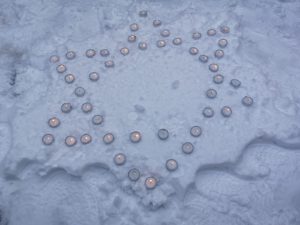 We went to Chelmno, an eerily quiet clearing in the forest the size of two football pitches the site of a mass grave where 350,000 Jews were taken to be murdered in cold blood and thrown into deep holes, one on top of the other. The area was covered in snow, but we could still see the outlines of where the mass graves had been cut out. Remains of human bones and teeth are still found in the earth there, and some of our people dug down and did indeed find some such pieces of our ancestors’ remains. We buried them with dignity, lit candles which we put in the snow in the shape of a Magen David and recited Kaddish for those dear departed souls. We sang Am Yisrael Chai loudly as we left – alive and defiant.
We went to Chelmno, an eerily quiet clearing in the forest the size of two football pitches the site of a mass grave where 350,000 Jews were taken to be murdered in cold blood and thrown into deep holes, one on top of the other. The area was covered in snow, but we could still see the outlines of where the mass graves had been cut out. Remains of human bones and teeth are still found in the earth there, and some of our people dug down and did indeed find some such pieces of our ancestors’ remains. We buried them with dignity, lit candles which we put in the snow in the shape of a Magen David and recited Kaddish for those dear departed souls. We sang Am Yisrael Chai loudly as we left – alive and defiant.
Auschwitz was shocking. We stood in the gas chambers where 1.2 million beautiful Jewish souls were mercilessly killed by poisonous gasses. They thought they were going into the showers and were told to remember the number of the hook they left their clothes on so that they could come and collect them afterwards. Once they were crammed into the chambers, the gas was pumped in, and those desperate people died a long, slow, painful death. We saw scratch marks on the walls where people were desperately trying to breathe and fought in vain for their lives.
Birkenau was so vast, the barracks were stark and basic, and the latrines were in one big area, offering no privacy or dignity. The in-mates wore thin cotton rags which were never washed or changed, and the weather they endured was bitingly cold, with temperatures plummeting to minus 25 in the depths of winter. Many of them contracted dysentery and other health problems. The Germans showed no sympathy or mercy. I have never heard stories of such cruelty and inhumanity, but alongside these, we also heard beautiful stories of kindness and benevolence, in direct contradiction to the Nazis’ tyrannical and brutal behaviour. Many of our Jewish relatives helped to support each other, and a good deal of them survived because of their fellow camp mates. It is incomprehensible to me how anyone survived such terrible conditions, but somehow they found an inner strength and determination. Amongst the horror and despair was also comradeship and bonding, which illustrated how strong the desire for survival can be.
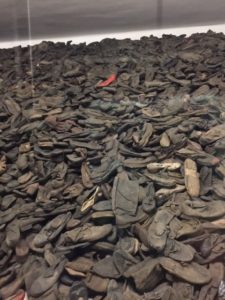 We saw displays of human hair, shaved from the Jews as they arrived in Auschwitz, the discarded empty suitcases – all their possessions were plundered by the Nazis, the glasses and the mountain of shoes.
We saw displays of human hair, shaved from the Jews as they arrived in Auschwitz, the discarded empty suitcases – all their possessions were plundered by the Nazis, the glasses and the mountain of shoes.
It was heart rending and distressing to see.
We went into the records room where names of all the victims are listed alphabetically in massive hanging books. These books take up the entire room.
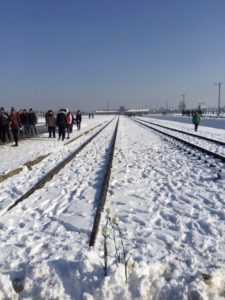 We walked the pathways of the camps with barbed wire on either side of us. We stood in the huge, vacuous barracks and saw the bunks, three tiers high where the prisoners slept three per bunk with a thin blanket to share. We saw the cattle trucks where they were crammed in with no food or water and travelled for days to get to the camp, many of them dying on the way.
We walked the pathways of the camps with barbed wire on either side of us. We stood in the huge, vacuous barracks and saw the bunks, three tiers high where the prisoners slept three per bunk with a thin blanket to share. We saw the cattle trucks where they were crammed in with no food or water and travelled for days to get to the camp, many of them dying on the way.
Someone had brought armfuls of white chrysanthemums and stuck them in the snow and into the handles of the cattle trucks – a little ray of hope within such devastation.
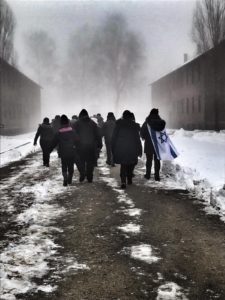 We cried a lot, but we also sang and danced in defiance and unity. We prayed and recited poems and meaningful words. We shared our own thoughts and emotions as fellow Jews, and we felt so connected to our Jewish brothers and sisters who perished. The SS soldiers were shockingly cruel. It is truly unbelievable that men can behave so barbarically, but not all of the stories were of horror and inhumanity, the wonderful stories of hope, courage and love had us feeling the strength and connection of the Jewish bond.
We cried a lot, but we also sang and danced in defiance and unity. We prayed and recited poems and meaningful words. We shared our own thoughts and emotions as fellow Jews, and we felt so connected to our Jewish brothers and sisters who perished. The SS soldiers were shockingly cruel. It is truly unbelievable that men can behave so barbarically, but not all of the stories were of horror and inhumanity, the wonderful stories of hope, courage and love had us feeling the strength and connection of the Jewish bond.
I returned from this trip feeling all kinds of different emotions, but the overriding one is of gratitude for the life I have. I have suffered my own personal loss, which has been life-changing for me and my family. Being part of this massive tragedy of our people and the terrible atrocities they endured has somehow helped me to reconnect with my faith and get my own loss into perspective. I feel blessed and grateful that I was born when and where I was. I feel honoured to have spent three meaningful days in the company of fellow Jews, all experiencing the same emotional journey together which has built friendships and a deep bond. I am particularly in awe of Mala Tribich and the other survivors who I am privileged to work with through AJR, and I feel duty bound to spread the word.
Rabbi Garson told us to build bonfires so that we light up the world with knowledge to ensure that such horrors are never allowed to happen again. I am steadfastly building those bonfires, and I urge and encourage everyone who hasn’t been, to go and see what our relatives went through. Some lucky ones survived – most didn’t. Only by going and standing on those very sites of brutality and mass murder is there any comprehension of the sheer enormity of inhumanity and madness of what took place. It will take me a long time to properly process what I saw and heard, but I believe I am a better person for the experience.
